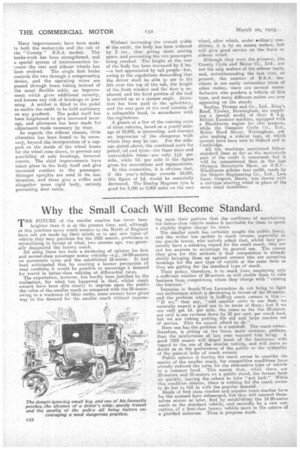Why the Small Coach Will Become Standard.
Page 34

If you've noticed an error in this article please click here to report it so we can fix it.
THE FUTURE of the smaller coaches has never been brighter than it is at the present time, and, although at this juncture many coach owners iij the North of England have not yet made up their minds as to any new types of vehicle they may purchase for the 1923 season, preference is crystallizing in favour of what, two seasons ago, was generally designated the luxury coach, All along there has been a hardening of opinion for first and second-class passenger motor vehicles—e.g., 14-20-seaterson pneumatic tyres and the established 28-seater. It had been anticipated that by creating a keener perception of road comforts it would be possible to encourage a demand for travel in better-class vehicles at differential rates.
The expectation, however, has hardly been justified by the realization, for what has happened is that, whilst coach owners have been able clearly to impress upon the public the value of the smaller coach as compared with the 28-seater, owing to a weakness iif their ranks, sorne.owners have given way to the demand for the smaller coach without impress
big upon their patrons that the costliness of maintaining the better-class vehicle makes it inevitable for them to quote. a slightly higher charge for tours. The smaller coach has certainly caught the public fancy, and the writer has spoken to coach owners especially at The seaside towns, who naïvely admit that,, whilst they personally have a sneaking regard for the small coach, they are not too anxious to encourage its general use. The reason they' give for this attitude is that competition is already slowly bringing them up against owners who are accepting bookings for the new type of vehicle at the same fares as they are getting for the standard type of coach.
Their policy, therefore, is to mark time, employing only a sufficient number of 20-seaters as will enable them to take business front competitors, whom they charge with "ruining the business."
Inquiries in South-West Lencashire do not bring to light any enthusiasm which is developing in favour of the 28-seater, and the problem which is baffling coach owners is' this :— "If we,' they say, "add smaller units to our fleet, 'we naturally expect a good use to be made of them; hut if we can only get id. per mile, the same. as for the 28-seater, not only is our revenue down by 20 per cent, per coach load, but we are risking putting the old and large coaches out of service. This we cannot afford to do."
Here one has the problem in a nutshell. The coach owner, therefore, is sitting on the fence, more cautious, perhaps, than the misfortunes of last year warrant him beeeg. A good 1923 season will dispel much of the hesitation with regard to the use of the smaller -vehicle, and will leave no doubt as to the preferences of the public or the _sympathy of the general body of coach owners. Public opinion is forcing the coach owner to consider the merits of the smaller coach, for competitive conditions have already reduced the rates for tho alternative type of vehicle to a common level. This means that, when there are 20-seaters and 28-seaters on a public stand, the former book un quickly, leaving the others to take " pot luck." While this condition obtains, there is nothing for the coach owner to do but to fall in with the popular demand.
Ideals of first class coaches and popular tours coaches have for the moment been submerged, but they will reassert themselves sooner or later, first by establishing the 14-20-seater coach as the standard vehicle, and secondly by a new conception of a first-class luxury vehicle more in the nature of a glorified motorcar. Thus is progress made.




















































